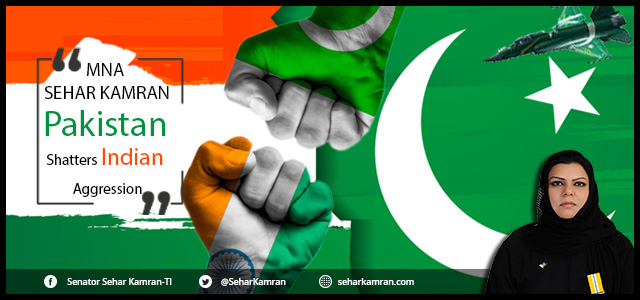 May 13, 2025 ISLAMABAD:
May 13, 2025 ISLAMABAD:
Unlike India’s impulsive escalation, Pakistan acted with caution and responsibility.
In a historic turn of events that captured the attention of the global community, Pakistan has once again demonstrated its military resolve, strategic brilliance, and unyielding patriotism in the face of unprovoked aggression. After days of simmering tensions and heightened anxiety following India’s missile strikes on May 7th, Pakistan launched a precise, well-coordinated, and firm response under Operation Bunyanum Marsoos, delivering a message to the world: Pakistan may prefer peace, but it is more than capable of defending itself when war is thrust upon it.
or too long, India has attempted to push its narrative of dominance, bolstered by propaganda, misinformation, and a false sense of superiority. But the events of the past week have upended this myth.
Pakistan’s retaliatory strike rattled India to its core, decisively dismantling 26 military targets across Indian-occupied areas, including the prized S-400 missile defense system—once considered a symbol of Indian invincibility.
The Director General of the Inter-Services Public Relations (DG ISPR) Ahmed Sharif Chaudhary confirmed the operation’s success, declaring it a “re-establishment of credible deterrence.” This was no empty rhetoric; Pakistan’s military capability was on full display. The surgical precision with which these strikes were carried out not only minimized collateral damage but sent a clear signal: Pakistan will not tolerate violations of its sovereignty.
Unlike India’s impulsive escalation, Pakistan acted with caution and responsibility. For days, Islamabad exercised restraint, exhausting all diplomatic avenues, showing the maturity and patience that responsible nations uphold. But when red lines were crossed, the response was swift and exacting.
In an operation that will be studied in war colleges for years, Pakistani fighter jets, led by some of the finest pilots in the world, overwhelmed Indian defenses and executed pinpoint strikes deep within enemy territory. Pakistan Air Force created history as 42 PAF jets fought against 72 Indian Airforce jets in the largest aerial combat in modern history which lasted for 59 minutes and emerged victorious. PAF destroyed six Indian fighter jets including three Rafale planes which were touted as a “game-changer” by Indian officials—were shot down by Pakistani air superiority along with Su-30 and MiG-29. The Indian Air Force, despite its modern arsenal, found itself outclassed by Pakistan’s superior planning, coordination, and execution.
The Pakistan Air Force has once again proven to be a jewel in the crown of national defense. The skill, bravery, and professionalism of its pilots turned the tide in the skies, became the king of the skies, and the morale of a nation soared with each confirmed target hit.
At the heart of this military success lies the exceptional leadership of Pakistan’s armed forces. Chief of Army Staff General Asim Munir emerged as the architect of this strategic victory. His calm demeanor, strategic foresight, and unwavering resolve guided Pakistan through a period of unprecedented pressure and uncertainty. Under his leadership, the armed forces not only protected every inch of the homeland but sent a message that aggression would be met with unrelenting force.
COAS General Munir’s coordination with other defense chiefs ensured that land, air, and intelligence units worked in perfect synchronization. This was not just a military operation—it was a showcase of Pakistan’s united and capable defense ecosystem, functioning at peak performance under existential threat.
Any discussion about this war would remain uncomplete without discussing and applauding China’s role and support for Pakistan. Chinese aircrafts and weapons proved to be a game-changer during Operation Bunyanum Marsoos. As tensions escalated, Beijing extended full-spectrum support—diplomatic, technological, and intelligence-based—solidifying the time-tested friendship that is “higher than the Himalayas and deeper than the ocean.
Furthermore, Chinese officials publicly praised Pakistan’s “measured and disciplined” military response and reiterated unwavering support for Pakistan’s sovereignty. In a world rife with shifting alliances, the China-Pakistan bond once again proved to be a cornerstone of regional stability and strategic balance. This joint defense success sends a strong message: when Pakistan and China stand together, no aggression can go unanswered.
While the armed forces executed the defense strategy flawlessly, the civilian leadership also played a vital role in rallying international opinion and presenting Pakistan’s case with clarity and conviction.
Former Foreign Minister and Chairman Pakistan People’s Party, Bilawal Bhutto Zardari, emerged as a strong diplomatic voice for Pakistan. At a time when Pakistan needed calm, measured leadership on the world stage, Bilawal delivered. His eloquence, diplomatic acumen, and patriotic spirit won widespread respect. His firm stance against Indian disinformation campaigns and his defense of Kashmir’s right to self-determination resonated across the Muslim world and beyond. It is now clear—Bilawal Bhutto Zardari has arrived on the global stage and is ready to play a pivotal role in Pakistan’s future.
As the dust settled, and the magnitude of Pakistan’s response became clear, the Indian establishment found itself reeling. With key military installations destroyed, the downing of Rafale jets, and the collapse of the illusion of air superiority, New Delhi was left with little option. In a stunning development, Indian officials reached out to global powers, including the United States, to broker a ceasefire. President Donald Trump played a crucial role in mediating a truce—an outcome that could only come after Pakistan demonstrated its unmatched defensive prowess.
In addition, U.S. President Donald Trump’s recent offer to mediate the Kashmir issue has once again internationalized the long-standing dispute, much to India’s dismay. In a statement that aligned with Pakistan’s long-held position, Trump referred to Kashmir explicitly as a “dispute”—a term New Delhi has vehemently avoided. This move has significantly undermined Prime Minister Narendra Modi’s narrative of Kashmir being an “internal matter” and has reignited global attention on the region. India, caught off-guard, is now attempting to downplay Trump’s remarks and recalibrate its diplomatic stance. For Pakistan, however, Trump’s acknowledgement marks a diplomatic win, reinforcing its call for international engagement and dialogue on Kashmir.
This victory is more than just military. It is psychological, diplomatic, and moral. It has breathed new life into a nation that has, in recent years, struggled with economic crises, political instability, and international pressure. It should be remembered that this ceasefire was not a favor to Pakistan—it was a diplomatic acknowledgment of Pakistan’s deterrent power. India had no choice but to stand down.
Across the world, the Pakistani diaspora erupted in joy and pride. Social media has lit up with praise for the armed forces, and the green crescent flag waved in cities far from home.
Perhaps more importantly, Pakistan’s stature has increased incrementally in the Muslim world. Today, Muslim Ummah sees Pakistan as a beacon of hope and resilience. In an era where Muslim nations face multifaceted challenges, Pakistan’s success is a source of collective inspiration for the entire Muslim Ummah. It reminded the world that with unity, faith, and discipline—as envisioned by the Father of the Nation, Quaid-e-Azam Muhammad Ali Jinnah—even the most formidable threats can be overcome.
The events of May 2025 will be remembered not only as a military triumph but as a moment of national resurgence. Pakistan has shown that peace is always its first choice, but never at the cost of dignity or sovereignty. Our armed forces have proven that they are prepared, alert, and capable of rising to any challenge. Let this victory be a reminder to the world: Pakistan is not to be underestimated. And to our adversaries, a clear warning—this nation stands united, resolute, and ready.
A version of this article is posted on The Nation


